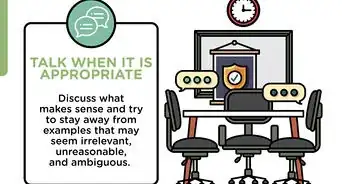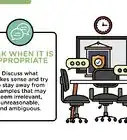This article was co-authored by Alexander Ruiz, M.Ed.. Alexander Ruiz is an Educational Consultant and the Educational Director of Link Educational Institute, a tutoring business based in Claremont, California that provides customizable educational plans, subject and test prep tutoring, and college application consulting. With over a decade and a half of experience in the education industry, Alexander coaches students to increase their self-awareness and emotional intelligence while achieving skills and the goal of achieving skills and higher education. He holds a BA in Psychology from Florida International University and an MA in Education from Georgia Southern University.
wikiHow marks an article as reader-approved once it receives enough positive feedback. In this case, 84% of readers who voted found the article helpful, earning it our reader-approved status.
This article has been viewed 51,291 times.
If you're a student struggling to pay attention during lectures, or a teacher wondering why your students aren't retaining the material you provide, learning about active listening strategies can help you out. If you're a student, come to class well rested, full of questions, and ready to monitor your energy and attention throughout the day. If you're a teacher, empower your students by listening to them, putting the material in their hands, and fostering discussion and debate.
Steps
Practicing Listening Strategies in Class
-
1Imagine a tunnel. If you get easily distracted in class, try visualizing a tunnel between yourself and the instructor. Doors opening and closing, students getting up and sitting down, and other noises and movements can really snag your attention if you don't regulate it. Train yourself to block out distractions. When the instructor isn't talking, imagine a tunnel between your face and the material you're supposed to be focusing on.[1]
- If you catch yourself listening to distracting noise or turning your head to look at someone leaving the room, remind yourself that they are outside the tunnel.
- The more you practice this, the better you'll do.
-
2Say "be here now." This is a technique for regulating your attention. Whenever your attention drifts, remind yourself to "be here now." You can also state (in your head) the topic at hand. Remember that when your teacher is talking, you are trying to learn what he or she is saying, and you need to be present to hear it.
- You may notice your attention has drifted because you are thinking about something else, not taking notes, or fidgeting.[2]
Advertisement -
3Set aside worry time. It's hard to listen in class if you're worried about other things. If you notice your mind returning to other work you have to do, make a note in your planner that you will worry at a certain time, say 4:15-4:30. Keep the date with yourself! Knowing that you have time to think will help you clear your mind and focus on class.[3]
Staying Engaged During Class
-
1Sit front and center. Sit in the front row, in the middle of the class, as close to the teacher as you can get. Students who do this get substantially higher grades than students who sit back or to the side. Get in early on the first day and stake out a seat, and stick to it.
- You will hear better if you are in the front row, as well as see better.
- It's harder for your attention to wander if the instructor can see your face.
-
2Participate in discussions. Answer questions, and ask questions when you get lost or when you have a thought. If your class is discussion based, be an active participant. Respond to other students' comments as well as the teacher's. If it is a lecture, write down questions as you go, and see if the professor answers them.
- At a moment of pause, ask the questions if they haven't been answered.
- Participating in discussion will stop you from drifting off. However, don't just wait for your turn to speak. The conversation may move on, and you don't want to zone out while you formulate your statement, only to miss a crucial point.
- If you participate, your ideas will become part of the work of the classroom. This means that you are implicated in the discussion—the instructor will direct comments at you, as may other students. Hearing your name will keep you actively listening.
-
3Prepare for class. Before each class, go over your homework and notes from the previous class. If you had to solve problems, go through them slowly and explain to yourself what the key concepts were and how you worked them out. Jot down any questions you were left with, as well as ideas you get from the reading.
- This may prepare you for questions your instructor will ask during class. It will also fill your head with material relevant to the class ahead, so that the new information you hear will have something to connect to.
-
4Take active notes in class. Don't write down everything the professor says, but write the main themes, and try to group information that seems related. Underline key points. Keep writing questions, and answer them if you can. If your notes point you to a question you can't answer, ask it in class, or ask another student after.
- Listen for clues before a lecture begins that will help you organize your notes. Your professor might say something like "I am going to discuss three main points…" "Now I want to move on to…" "Let's not forget to mention the contribution of…" "To summarize…"
- Take note when words or phrases are being repeated. Underline or circle in your notes any words that seem to be significant.
-
5Don't take too many notes. If you try to copy everything down, you won't take anything in. Your main task is to listen and engage. Use shorthand for repeated words and references. Don't copy slides if they're going to be available online or in a handout.
- If you have a handout, write brief notes in the margins instead of having a separate page of notes.
- If your teacher permits you to record class, you can take notes comfortably without being worried about missing anything. Plus, when you listen to the recording again, you can then make side notes about the important things you didn't catch the first time.[4]
- Skim your handout beforehand so you have an idea of the content of the lecture.
- If you are dyslexic or cannot write notes and listen at the same time, ask if you can get help. Some schools have professional note-takers, some teachers will help you arrange to share notes with a classmate, and some teachers don't mind if you record the class and listen again later, taking notes and pausing.
-
6Regulate your energy. Check in with yourself as your class goes by. If you are feeling hyper, take a few deep breaths and try to relax your body. If you are feeling sleepy, sit up straight and stretch a little. Check in at the beginning of class, at break, and whenever you notice yourself acting unfocused.
- Notice how you are sitting—are you tapping your foot? Tearing paper? Doodling? Staring out the window? Adjust yourself in your seat and remind yourself to focus on the lecture.
- Regulate your emotions. Check in with your emotional state as well as your energetic state. Are you down on yourself? Sad? Happy? Worried?
- State how you feel instead of pushing it away. Take a minute to think "I am anxious" or "I am proud" so that you own it and it doesn't distract you.
-
7Take care of your body. Get a full night's sleep every night. Adults need 7-8 hours of sleep a night, and teenagers need 9-11 hours.[5] Eat breakfast, lunch, and dinner. Come to campus with water and a healthy, satisfying snack on hand, like nuts or fruit.
- Shift in your seat to stay alert, and get up and walk around during the break. Your mind wakes up when your body does.
Keeping Your Students Engaged
-
1Get to know your students, and help them get to know you. Students will zone out less if they think of you as a person, not an authority figure. Encourage students to speak to you before and after class, or in office hours if you have them. Have your students include some of their own personal experience in discussions and writing assignments, and share material from your life if it is appropriate.[6]
- You can maintain professional boundaries without acting cold or inhuman. Don't probe for information about your student's personal lives, but know that their personal experience informs their thought processes, and they will be interested in how your personal experience informs yours.
-
2Lecture less. Lectures are effective at delivering information, but they are not effective for stimulating thought, teaching values, or inspiring interest in a subject. When you lecture, keep it brief and informative, or break it up with other forms of work: group discussions, pair presentations, or individual reflection and problem-solving.
- When you do lecture, show slides, and engage students in questions and answers.[7]
- Change approaches every 10-15 minutes to keep students engaged.
-
3Encourage discussion. Your students will think more critically if they are debating (and learning from) one another. Discuss daily with a smaller class, and put them in groups if your class is large. If your students are hesitant to disagree with you, take yourself out of the mix—have them sit in a circle and talk, and observe them, taking notes, from the margins. Only interfere if they are behaving badly or not being rigorous.[8]
-
4Bring in other voices. Have students listen to guest speakers, and video or audio clips. Give them worksheets, or tell them what information to look for, to encourage them to listen actively and take efficient notes. Your students will learn how to listen to you if you give them exercises that teach them how to listen to others.[9]
-
5Insist that they listen. Every few minutes, ask questions and check for comprehension. Call on students who are not speaking. Encourage them to ask you questions and to respond to one another. Don't design your class to be attendance-optional. Portions of your class should only be available from attentive attendance. #*You may share slides online, but your students should be getting information from you and from class discussion.[10]
- Connect their homework and tests to material and critical thinking they perform in class.
- Do this from the first day, so that they get in the habit of paying close attention.
- Hold them accountable for listening to you and to one another. Ask them to restate your points and things their classmates say.
-
6Listen to your students. Model attentive listening by paying close attention when your students talk. Rather than trying to anticipate their questions, or supplying words for them, let them struggle to get it out. When they have, echo what they say back to them. Restate their question to let them know that you hear them (and to help their classmates in the back row keep up).[11]
- Answer them, then ask if you answered their question.
Expert Q&A
-
QuestionHow can I improve my listening skills in English?
 Alexander Ruiz, M.Ed.Alexander Ruiz is an Educational Consultant and the Educational Director of Link Educational Institute, a tutoring business based in Claremont, California that provides customizable educational plans, subject and test prep tutoring, and college application consulting. With over a decade and a half of experience in the education industry, Alexander coaches students to increase their self-awareness and emotional intelligence while achieving skills and the goal of achieving skills and higher education. He holds a BA in Psychology from Florida International University and an MA in Education from Georgia Southern University.
Alexander Ruiz, M.Ed.Alexander Ruiz is an Educational Consultant and the Educational Director of Link Educational Institute, a tutoring business based in Claremont, California that provides customizable educational plans, subject and test prep tutoring, and college application consulting. With over a decade and a half of experience in the education industry, Alexander coaches students to increase their self-awareness and emotional intelligence while achieving skills and the goal of achieving skills and higher education. He holds a BA in Psychology from Florida International University and an MA in Education from Georgia Southern University.
Educational Consultant Ask your teacher if you can record the class. That way, if your attention does drift during class, you can go back to the recording and figure out what you missed.
Ask your teacher if you can record the class. That way, if your attention does drift during class, you can go back to the recording and figure out what you missed. -
QuestionHow do I get the courage to ask questions in class?
 Julia ZuklieCommunity AnswerNobody can tell you how to get courage, but just know that somebody else probably has the same question as you and is anxious for someone to ask it too. Also, asking questions in class makes you look smart and shows your teacher that you are trying hard.
Julia ZuklieCommunity AnswerNobody can tell you how to get courage, but just know that somebody else probably has the same question as you and is anxious for someone to ask it too. Also, asking questions in class makes you look smart and shows your teacher that you are trying hard.
References
- ↑ https://www.k-state.edu/counseling/topics/career/concentr.html
- ↑ https://www.k-state.edu/counseling/topics/career/concentr.html
- ↑ https://www.k-state.edu/counseling/topics/career/concentr.html
- ↑ Alexander Ruiz, M.Ed.. Educational Consultant. Expert Interview. 18 June 2020.
- ↑ http://newsroom.ucla.edu/releases/cramming-for-a-test-don-t-do-it-237733
- ↑ http://www.facultyfocus.com/articles/teaching-and-learning/active-listening-seven-ways-to-improve-students-listening-skills/
- ↑ http://www.sciencemag.org/news/2014/05/lectures-arent-just-boring-theyre-ineffective-too-study-finds
- ↑ http://www.facultyfocus.com/articles/teaching-and-learning/active-listening-seven-ways-to-improve-students-listening-skills/
- ↑ http://www.facultyfocus.com/articles/teaching-and-learning/active-listening-seven-ways-to-improve-students-listening-skills/














































































